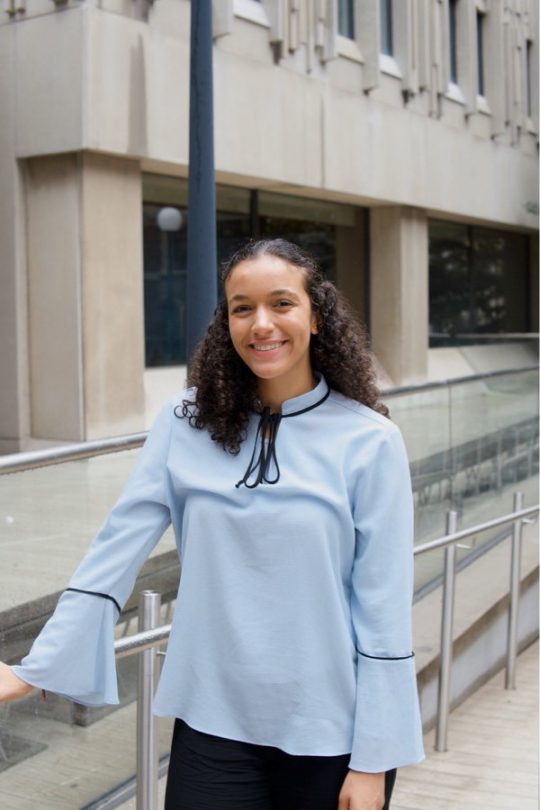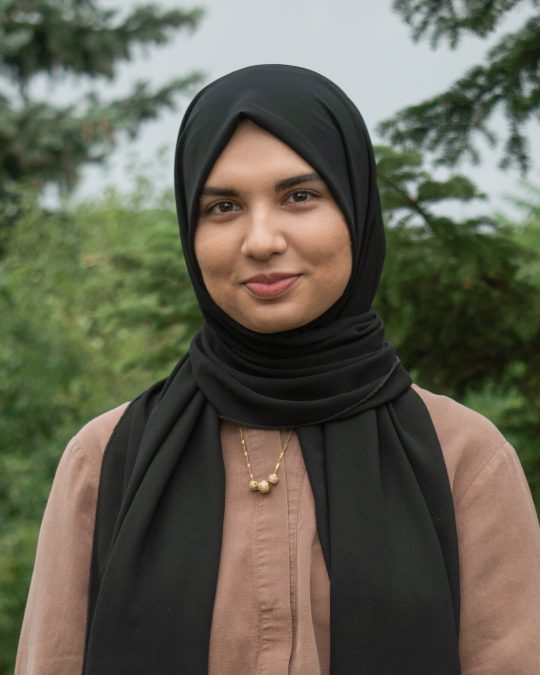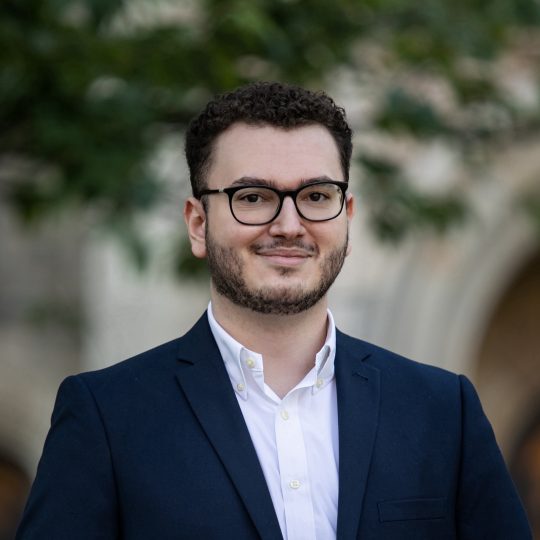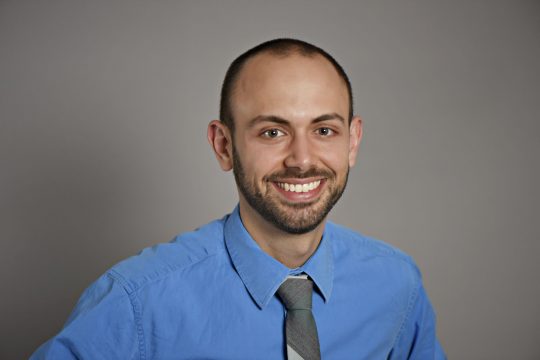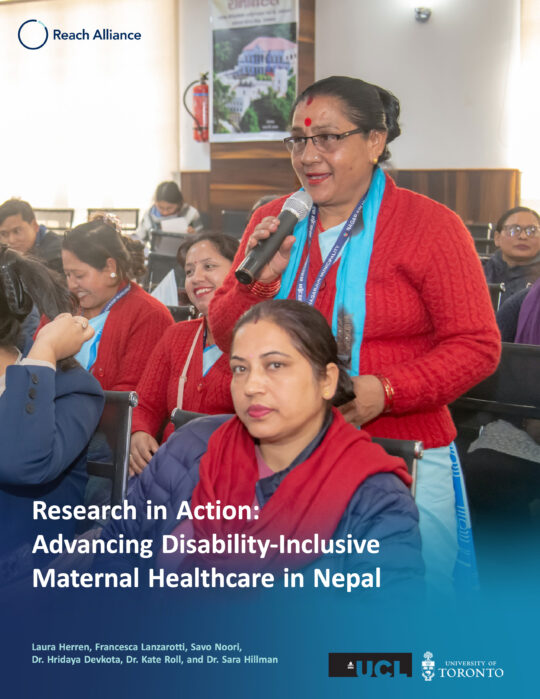Executive Summary
Promoting access to essential and accurate information, especially in development and humanitarian contexts, is an integral component of promoting the UN Sustainable Development Goals. In South Sudan, over 80 per cent of the population grapples with high levels of poverty, resides in rural areas, and lacks information that is vital to their lives — including information on public services, health, and basic rights. Local and international actors have increasingly implemented Communication for Development (C4D) strategies to help promote access to information in South Sudan and elsewhere, using strategic communication mechanisms and curated information to achieve positive social and behaviour change.
In recognition that the most vulnerable communities in South Sudan have limited access to information, a group of young innovators launched the Blue Messenger Bicycles (BMB) initiative in early 2020. BMB includes a team of 50 volunteers who travel in and around Juba on blue bicycles mounted with a megaphone, battery, and GPS to broadcast life-saving information to citizens in five different languages. In partnership with organizations such as the UNDP Accelerator Lab and UNICEF South Sudan, the BMB initiative prioritizes the information needs of the most vulnerable communities to help address infectious disease outbreaks, conflict recovery, and natural disasters.
Through a series of seven semi-structured interviews with stakeholders from five organizations actively involved in C4D efforts in South Sudan, we explore local and international perspectives on the implementation of C4D programs there. The BMB initiative, one of the first of its kind around the world, serves as an illustrative case study to examine the use of local communication mechanisms, the sustainability of operations as a grassroots organization, and the outcomes of C4D initiatives.
Communication for Development in South Sudan
Access to information is central to creating stronger and more resilient communities around the world. Communication for Development (C4D) has become an increasingly popular strategy used to promote the Sustainable Development Goals (SDGs) in South Sudan and elsewhere. At its core, C4D’s goal is to promote people-centred development, one of the key aspirations of the SDGs. Although C4D serves as a broad umbrella term, in 1996 the United Nations General Assembly formally defined it as “two-way communication systems that enable dialogue and allow communities to speak out, express their aspirations and concerns and participate in decisions that related to their development.” This definition is driven by the knowledge that involvement of individuals from all sectors of society is possible only when “broader and more equal participation reflecting society as a whole is considered a prerequisite for more response and democratic governance and sustainable development.”1
Various development actors have advanced complementary definitions of C4D since then, but simply defined it refers to the strategic use of communication mechanisms and curated information to achieve positive change. Such information may be relayed through numerous channels, including interpersonal conveyance, television, radio, newspapers, and social media. Development actors have recently used C4D to address and improve social norms, behaviours, and practices, with some stakeholders in the international field referring to C4D as social and behavioural change communication (SBCC).
C4D recognizes that access to accurate and essential information is central to creating stronger and more resilient communities around the world. In areas without access to information, citizens are unable to make informed decisions, fully participate in public dialogue, or inform policy processes that affect their lives. Accordingly, the C4D global theory of change, most notably advanced by UNICEF, identifies four key goals of C4D initiatives:
Increased demand for services by using mass mobilization campaigns to dispel myths, develop gender-sensitive communications, and promote services such as immunization, education, and birth registration.Uptake of key community practices by disseminating information on how to engage in healthy behaviours around issues such as childcare, hygiene, and nutrition.Adoption of positive social and behavioural norms by using mass media, community theatre, home visits, discussion groups, and other interpersonal communication activities to raise awareness about the negative consequences of harmful norms such as discrimination and supporting community influencers to encourage the adoption of positive norms such as education inclusion for girls.Engagement and empowerment of communities in both development and humanitarian contexts by holding service providers and policymakers to account, creating more participatory decision-making processes, and helping individuals act as agents of change.2
The cross-cutting aim behind these goals is influencing positive change at all levels of society: individuals, families, communities, institutions, and systemic policies. C4D ultimately considers broader and more equal participation reflecting society as a whole as a prerequisite to achieving sustainable development. In particular, C4D is grounded in an equitable human rights approach that prioritizes the information and communication needs and interests of the most vulnerable communities.
In humanitarian contexts C4D interventions are a critical component of addressing infectious disease outbreaks, conflict, and natural disasters. For example, Voice Post’s Blue Messenger Bicycles (BMBs) seek to provide vulnerable communities with access to life-saving information before, during, and after crises to promote emergency preparedness, the adoption of healthy and protective behaviours, and two-way communication during humanitarian action. In conflict-affected countries such as South Sudan, C4D interventions can help spread messages of peace and reconciliation to narrow divisions between groups.
However, with information and communication technologies growing exponentially around the world, communication mechanisms can just as equally promote violence. Many conflicts internationally have been fueled by information dissemination, with one of the most tragic examples being the use of radios in supporting genocide in Rwanda.3
Citizens in South Sudan have limited access to accurate and essential information as a result of compounding socioeconomic, political, and environmental factors. Often referred to as the world’s newest country, South Sudan formally gained independence in 2011 following decades of conflict between the Sudanese government and rebel forces in the South. The former Sudan was originally created in 1956 following colonial rule but multiple periods of civil war, both in the 1970s and from the 1980s onward, displaced 4 million people with another 2 million killed in conflict.4
Figure 1. A Voice Post community engagement project supported by the Canadian Fund for Local Initiatives (Credit: Voice Post).Since South Sudan’s independence in 2011, continued conflict and a civil war that ended in 2018 have exacerbated economic hardships and hindered flows of information between citizens, government, and civil society. This has resulted in citizens often having access to information that is inaccurate or that has the potential to reverse measures taken to advance equity and peace in society. For instance, only 7 per cent of the population uses the Internet.5 6
However, misinformation and disinformation have also played a historical role in South Sudan, mostly after the coup in December of 2013.7
Relevant UN Sustainable Development Goals
SDG 3 — Good Health and Well-Being: Voice Post actively works to provide life-saving public health information to hard-to-reach populations through the BMBs. By employing their C4D interventions through direct engagement with local communities, Voice Post encourages well-being by promoting accurate information and healthy and protective behaviours that promote well-being. For example, Voice Post promotes immunization, practising hand hygiene, and other disease prevention strategies.
SDG 11 — Sustainable Cities and Communities: One of the major priorities behind building sustainable communities is reducing the adverse effects of natural disasters. Through the package information conveyed by the BMBs, Voice Post has helped provide life-saving support to communities prone to flooding in the Juba area. This is especially important since information on the number of deaths and missing persons caused by natural disasters in the country is currently unavailable. This possibly signifies the lack of state prioritization on natural disaster response and recovery.
SDG 16 — Peace, Justice, and Strong Institutions: Through the BMBs, Voice Post actively works to promote social cohesion and relationships between communities by sharing information that fosters peace building and mutual dialogue. With strategic messages developed and recorded with religious leaders, international organizations, and members of local communities, justice and community engagement are key pillars of Voice Post’s commitment to strengthening societal institutions.
SDG 17 — Partnership for the Goals: By working with numerous stakeholders such as UNDP and UNICEF, Voice Post has helped foster collective action and supported international engagement with development issues and humanitarian action.
The Hard to Reach
With an estimated population of 11.5 million people, South Sudan is home to over ten ethnic groups, including the three largest groups: the Dinka, Nuer, and Shilluk. The country is battling severe information inaccessibility and a lack of information infrastructure resulting from compounding socioeconomic, political, and environmental factors that render many communities vulnerable in the face of crisis.
Geographic Isolation and Poverty
Over 80 per cent of South Sudan’s population resides in rural areas, with vulnerable groups such as the elderly and people with disabilities even less likely to move far from their homesteads. Only 2 per cent of the approximately 10,000 kilometres of roads in South Sudan are paved, so transportation and movement within the country are difficult and unsafe. Combined with a shortage of personnel and resources, the poor transportation infrastructure has led to the country’s maternal mortality rate being among the world’s highest.8
Because around 66 per cent of the population lives below the poverty line on less than two dollars a day, many households cannot afford a radio, which is the main source of information broadcasting.9
Climate Change and Natural Disasters
South Sudan is prone to natural hazard risks such as floods and droughts that often affect information pathways throughout the country. At the end of 2021, ongoing floods affected over 835,000 people across eight states. Residents were forced to relocate because of the floods — the worst in 60 years — and many health facilities, schools, and markets remain submerged.10 11
Political Tension
Intense civil conflicts erupted between government forces led by President Salva Kiir and military forces led by Riek Machar after the country gained independence.12 13
Many international organizations and global humanitarian groups provide aid to South Sudan (it’s one of the world’s poorest countries). However, a main barrier to the delivery of humanitarian aid there is the risk of danger to humanitarian workers, fuelled by political tensions and intercommunal violence. For instance, in 2021, a representative of the UNMISS released a statement indicating that South Sudan is becoming “one of the most dangerous places to operate for humanitarian workers.”14
Figure 2. A BMB mobilizer with community members in Juba (Credit: UNDP South Sudan).Voice Post: Blue Messenger Bicycles
In early 2018, a group of young innovators founded Voice Post, a grassroots organization aimed at promoting information sharing and community engagement under the slogan “Information Is Aid.” Prior to launching Voice Post, its founder, Atem Sijin, worked as a communications specialist for various NGOs and international organizations. In a discussion with UNDP South Sudan, Sijin revealed that the motivation behind the organization was to inform communities before, during, and after crises. To combat information inaccessibility, Voice Post, in collaboration with partners such as Junub Open Space (JOS) and with early support from the Ministry of Health of South Sudan, officially launched their BMB initiative in early 2020.
The initiative began as an idea to create a tool for communication: a bright blue bicycle mounted with a megaphone, amplifier, battery, generator or solar panel, a GPS system, and a USB flash drive to disseminate pre-recorded messages on topics such as health campaigns (e.g., polio vaccination, COVID-19 hygiene), natural disaster response (e.g., floods), and humanitarian action (e.g., food distribution, mine safety awareness). Whenever communities showed signs of information fatigue, Voice Post would shift their messaging to ensure that individuals were still absorbing the information being broadcast. For instance, the BMBs turned to polio campaigns after conducting COVID-19 messaging. While the concept appears deceptively simple, Voice Post and the BMBs were the first innovation of its kind in South Sudan when it comes to scalability of operations. Given the poor road and transportation infrastructure in the country, bicycles are an ideal form of transportation. They allow the mobilizers to travel to communities that are inaccessible by cars and would be difficult to travel to by foot.
In February 2020, the first fleet of BMBs had three bicycles and mobilizers were deployed to disseminate information to local residential areas in and around Juba. When the COVID-19 outbreak struck the nation, the South Sudan Ministry of Health (SSMOH) saw the need for increased awareness of COVID-19 and supplied Voice Post with an additional 15 bicycles to spread messages about controlling the spread of the virus. Their efforts during the pandemic’s onset proved that their concept was impactful and practical. International organizations witnessed the use of the BMBs as a valuable grassroots communication mechanism.
In October 2020, with technical support and expertise from UNDP South Sudan’s Accelerator Lab and Communications Unit, Voice Post received an additional 50 additional bicycles to further their reach into communities with limited information access. At the time of the BMBs’ peak operations from October to December 2020, the initiative employed 50 volunteers (46 males, 4 females), most of whom were youth with educational backgrounds ranging from high-school graduates to university students. These volunteers, known as mobilizers, rode around Juba to spread life-saving information while also communicating with their local community members.
In January 2021, information poles were installed across Juba markets and bus parks to increase information dissemination in areas with higher population densities. While their bicycles allowed BMB to reach remote geographical areas, the information poles would help disseminate information to the general public. Since then, Voice Post has piloted two other additions to the BMB initiative: Blue Messenger Motorbikes and the Blue Messenger Boats. In September 2021, Voice Post began mounting solar panels onto their fleet of bicycles in order to reduce their pollution levels (they formerly used generators to power their batteries).
The Blue Messenger Motorbikes deliver life-saving information to distant places when urgently needed, while the Blue Messenger Boats are used for areas affected by floods. Despite the emergence of other similar initiatives since the
Figure 3. A Blue Messenger Bicycle featuring the Voice Post slogan “Information is Aid” (Credit: UNDP South Sudan).launch of BMB, Voice Post is arguably the most adaptable. It is not siloed to one specific area such as health, and it does not target one specific population for its operations. The BMBs aim to respond to situations as they occur (e.g., natural disaster relief, food scarcity, health campaigns, peace, and reconciliation), and they can easily be scaled up to accommodate other regions and other circumstances that require increased information access.
Voice Post and its BMBs use a “human-centred” or “bottom-up” approach. Because both the staff and the volunteers are members of the affected communities, they are more knowledgeable about the needs in those vulnerable environments. The sense of trust between the mobilizers and the intervention’s end users is strong thanks to their pre-existing connections in the community. In South Sudan, teachers are highly respected, which is one of the characteristics that Voice Post searches for when selecting volunteers. Although volunteers aren’t teachers, their respected status greatly increases the trust community members have for the messages being broadcast by BMB. Bicycles also have a positive connotation in the culture, which is a unique aspect of the initiative targeted directly within the context of South Sudan. As opposed to a “top-down” approach to humanitarian intervention, this “human-centred” approach allows for those who are affected by crisis to be at the heart of the solutions to challenging global issues.15
Governance, Decision Making, and Collaborating Partners
While the BMB initiative was launched in collaboration with JOS, both Voice Post and its BMB initiative are governed by the organization’s staff. During the initial stages of the BMBs, Voice Post had seven staff members, with over 50 volunteers on their fleet. However, the pandemic led to staffing changes since their operations have slowed, and current staff work within every area of the organization whenever necessary. Currently, they are down to 20 cyclists. Most executive decisions are made by the founder, Atem Sijin.
During the initial stages of the BMBs, UNDP was one of Voice Post’s major collaborating partners and provided both financial and strategic support. The collaborating partners of Voice Post and the BMB initiative consistently change depending on the campaign. For instance, one of Voice Post’s very first collaborations was with the Solidarity Action Group (SAG) and Jonglei Run for Peace (JR4P) to create COVID-19 awareness campaigns. Throughout the pandemic, they have also partnered with organizations such as the South Sudan Association for People with Disabilities, youth organizations under the Ministry of Youth, Culture, and Sport, as well as the Risk Communications and Community Engagement Technical Working Group (RCCE TWG) to further disseminate messages surrounding COVID-19 awareness, safety, and hygiene. In October 2021, Voice Post partnered with the Embassy of Canada in South Sudan through the Canada Fund for Local Initiatives program to spearhead a project called “Using Indigenous Knowledge to Prevent Ethnic Conflicts and Advocate for Peace and Reconciliation Learning Exchange Workshop,” which involved hosting workshops and concerts to disseminate messaging about local peace building and reconciliation.
Finances
The bulk of BMB operations were launched and sustained thanks to generous donations by international organizations such as UNDP and UNICEF with their donations of 50 bicycles and five information poles, respectively.Each bike has a solar panel that costs USD 35 per bike and a GPS device that costs USD 150 per bike. Despite these being one-time investments, there were difficulties obtaining funding. While their operations mainly depend on funding from donors, Voice Post launched their Adverts4Charity program in 2021 as a part of their sustainability plan to raise funds by providing advertising services to local businesses through the BMBs. However, more substantial long-term funding would likely be necessary to relaunch the BMBs into full operation.
Implementation of the Blue Messenger Bicycles
To create and operate a sustainable fleet, Voice Post conducted capacity-building training with their volunteer mobilizers. The training involved sessions focused on amplifier and megaphone repair skills, road safety skills, and C4D interpersonal communication skills.16
Figure 4. A Blue Messenger Bicycle (Credit: UNDP South Sudan).community members. This contrasts with radio, which is the most common communication tool in South Sudan. With radio, people sometimes listen to the broadcast without necessarily understanding its content. And if they have questions about any of the information presented, they would not have a way of getting answers.
Information and messaging broadcasts using the BMBs depend on which campaign is being conducted. For instance, in their October 2020 initiative coordinated with the RCCE TWG, messages of COVID-19 awareness were developed and recorded by the TWG and broadcast by the BMBs in five main languages: Arabic, English, Dinka, Nuer, and Bari. Since the mobilizers are trained in communications skills and two-way communication, Voice Post took advantage of the campaigns to collect community complaints and feedback to present recommendations to the RCCE TWG to ensure that their risk communications messaging was informed by community voices. By contrast, the messaging used in their “Using Indigenous Knowledge to Prevent Ethnic Conflicts and Advocate for Peace and Reconciliation” project involved developing messaging alongside local community leaders and chiefs to incorporate Indigenous knowledge recommendations into their messages of peace and reconciliation. In this project, the content was developed alongside the leaders and chiefs and then recorded by the Voice Post staff and BMB volunteers. While learning how to record the messages, Voice Post partnered with a radio station in Wau to partake in a workshop teaching the basics of recording messages for broadcast. In other words, the information curated and how messages are recorded and broadcast depend on the campaign.
Measuring Impact and Reach
Since the launch of the BMB initiative, Voice Post has achieved many milestones as a local, volunteer-driven, grassroots organization. In the span of three months (October to December 2020), the initiative addressed 720,000 households, reaching approximately 2,160,000 people with life-saving information on topics like COVID-19, malaria, polio, and diarrhea. Peak hours for the mobilizers are mornings and evenings when residents are carrying out their daily routines and going to or returning from work. While disseminating messaging about COVID-19, they also collected 100 complaints and pieces of feedback from the communities. Based on their calculations, one BMB can cover 240 households, reaching approximately 1,440 people (six per household).17
Distribution Plan
In Voice Post’s BMB Awareness and Community Feedback Report, they reported covering 4 main zones, 13 blocks, and 68 villages across Juba: the Gumbo zone, the Jebel zone, the Gudele zone, and the Thongpiny zone. Their distribution plan was carefully crafted by the executive team based on the population density of the areas to ensure that most individuals could be reached with the resources they had.
At the peak of their operations, they reported the number of households and people reached monthly. By using bicycles as their main form of transport, the BMB mobilizers reached even the hard-to-reach areas of Juba, such as remote communities with little-to-no road access.
• Gumbo zone: 8 BMBs — 38,400 households monthly — 230,400 people reached monthly
• Jebel zone: 12 BMBs — 57,600 households monthly — 345,600 people reached monthly
• Gudele zone: 20 BMBs — 96,000 households monthly — 576,000 people reached monthly
• Thongpiny zone: 10 BMBs — 48,000 households monthly — 288,000 people reached monthly.
Table 1. Blue Messenger Bicycles – Juba Zones and Blocks Distribution Plan (Source: Voice Post).While their operations slowed because of a lack of funding and the ongoing pandemic, BMB coordinators expressed an interest in expanding their zones once they return to normal operations. For instance, they hope to reach other states, focusing on those that are especially deprived of information access — including Nimule (CES), Rumbek (Lake State), Yambio (WES), and Torit (EES), among others.
In addition to their regular operations with their mobilizers, Voice Post also engaged in various other information campaigns to supplement the BMB initiative’s impact. Prior to BMB’s launch, Voice Post partnered with the State Ministry of Health in Western Bhar El Ghazal in August 2019 for their Maternal Neonatal Tetanus Elimination (MNTE) campaign in Wau, where they set up an information kiosk broadcasting messages related to MNTE in different languages including Jurchol, Dinka, and Balanda. Thanks to their efforts, they vaccinated 500 women in two days, setting a record for the highest number of individuals vaccinated since the start of the campaign.
The campaign also combatted rumours and misinformation. One vaccinator was turning away women who were less than three months pregnant because they thought that the vaccine could cause miscarriages. Volunteers spoke to Voice Post about their concerns and then received confirmation from the State Ministry of Health that the vaccine is safe for pregnant mothers. Broadcast messages asking mothers to take the vaccine to protect themselves and their unborn children resulted in 25 additional pregnant women showing up to receive the vaccine after the rumour was dispelled.
Despite not having had any wild polio outbreaks for more than 10 years, the country confirmed 15 cases of vaccine-derived poliomyelitis in the latter half of 2020. The Ministry of Health formed an emergency task force to combat this outbreak and prevent further spread of the disease. The task force, supported by the World Health Organization, UNICEF, and other partners, including Voice Post, made arrangements to launch a campaign to vaccinate 1.5 million children against polio. While exact statistics indicating the contributions of Voice Post and the BMBs in this fight against polio are unavailable, the outreach of the campaign increased the immunization rate of children against the disease. For instance, according to one of the real-time routes tracked using the GPS device, they broadcast polio campaign messages and reached over 350 households across 10 kilometres.
Their efforts and the impact of the BMB initiative were recognized when Voice Post won the “Most Innovative/Transformative Peace-Making Program” award at the 2020 South Sudan NGO Forum. Staff at Voice Post have recently been in contact with the Ministry of Information, Communication Technology and Postal Services to discuss nationalizing the communication tool to further expand the BMBs’ reach. Thanks to the simple nature of the initiative, it would be easy to scale its operations to cover different regions and different topics of information dissemination.
Figure 5. Solar panels installed on a Blue Messenger Bicycle (Credit: Voice Post).Barriers to Success
Many grassroots organizations are attempting to deliver services or interventions to hard-to-reach communities today and struggle with similar challenges. Therefore, developing a better understanding about the unique applications or strengths of grassroots models, as well as their limitations, is important to devising methods to support such organizations and their efforts toward the SDGs.
Funding and Other Resource Limitations
Some of the key factors limiting the efficacy and sustainability of BMB operations are financial constraints and limited financial, technical, and human resources. There are several contextual factors determining the financial success of a grassroots organization. First, the presence of other grassroots organizations in the region, especially those with similar organizational goals, can act as competition to organizations like Voice Post that rely largely on funding and other resources from donors. In South Sudan, where several grassroots organizations are competing for a relatively limited pool of funding from international organizations such as UNICEF South Sudan, or impact investors such as the Impact Cap Initiative, the portion, frequency, and likelihood of obtaining sufficient funding for Voice Post to run its operations successfully decreases. In response, Voice Post has actively led efforts, such as the Adverts4Charity campaign in which they partnered with civil society organizations and businesses to raise funds for the organization’s operations. While each of these fundraising initiatives has had degrees of success, they could not sustain BMB programming long-term.
Because of interruptions in funding, the organization’s operations were disrupted, which not only halted current progress in achieving their C4D goals but also delayed the intervention’s potential
Figure 5. A Blue Messenger Bicycles mobilizer disseminating messages in Gudele in Juba (Credit: UNICEF South Sudan).for scale-up. In this way, funding constraints are a significant barrier to the initiative’s sustainability and scale-up plans, reducing their potential and efficacy to reach their target communities.
From the perspective of donor organizations, a challenge that grassroots organizations like Voice Post face in securing funding, especially for long-term projects, is the lack of thorough measures of results and reporting. Donors such as UNICEF South Sudan assess potential financing recipients using several criteria, including but not limited to a clear strategic plan, measurable goals, documented results of the intervention, etc. Quantitative metrics and statistics of reach, such as the number of individuals successfully targeted by an intervention, quantity of active staff members, and number of organizational goals achieved after the intervention delivery, can act as indicators of an organization’s impact. However, the absence of a plan or system to record the results of an intervention, or insufficient human resources or administrative infrastructure (i.e., appropriate measurement tools and technologies) can hinder record keeping of an organization’s impact, making them a less competitive applicant for funding opportunities.
Another barrier that may play a role is the disconnect between the expectations for funding application success between donors and recipient grassroots organizations. Sometimes donors do not clearly communicate the criteria for successfully receiving financial, technical, or human resources to potential recipients, or else other challenges such as lack of guidance from donors to eligible recipient organizations during the application process impede the recipients’ understanding of the criteria for successful applicants. Due to poor measurement or reporting of impact statistics, donors may have difficulties assessing the sustainability, impact, and potential for scaling up grassroots initiatives, which makes the process of attaining funding and resources more difficult for recipient organizations.
Contextual Challenges of Operating in South Sudan
Operating in South Sudan presents contextual challenges — including opposition to women’s involvement in the workforce, low public literacy rates, and lack of Internet or other communications media access — that affect BMB operations and efforts in successfully reaching its target communities.
LACK OF WOMEN’S INVOLVEMENT IN THE VOLUNTEER WORKFORCE
Since Voice Post is a volunteer-led organization, it relies on the participation of local youth
Figure 6. Anyier Malual volunteering for the Blue Messenger Bicycles (Credit: UNICEF South Sudan).To address this and prioritize the inclusion of women in its operations, the BMB initiative accepts female volunteers willing to get involved with its mission and is committed to providing them with training in their areas of interest. While some women act as mobilizers, others may be interested in receiving training to maintain or repair the bicycles. One of the female BMB volunteers was awarded for her commitment and services to the team with the “Best Messenger of the Month” award. For those who are not interested or skilled in either, another opportunity for involvement is to be trained to do administrative tasks.
To attract more women volunteers, Voice Post also recruited Anyier Malual, a model and Miss Jonglei 2020–2021, to volunteer as a BMB mobilizer. Although it is not well-regarded for women to ride a bike in Malual’s Dinka culture, she aimed to change social norms and attitudes surrounding women’s rights by volunteering with Voice Post. Given her status as an influential figure in South Sudan, her participation was aimed to inspire young girls and change people’s behaviours while also disseminating life-saving information through the BMBs.
COMMUNITY RESISTANCE TO INFORMATION CAMPAIGNS
The low literacy rates and lack of Internet and other accessible information sources also encourage the spread of disinformation in the communities BMBs target with their campaigns. At times, this creates resistance in the community to the BMBs’ messaging and may not immediately result in the intended social and behaviour change. The initiative faces this barrier well because the mobilizers delivering information are community members who speak the local languages and are often well-known
Rumours circulating within communities surrounding certain topics, for example, COVID-19 vaccinations, are monitored and recorded by the mobilizers, and shared with the BMB volunteers responsible for curating information messaging. These volunteers analyze where the rumour originated and how it may have originated, and then design messages that the BMBs bring back to communities to respond to and debunk the disinformation. The process allows Voice Post to not only deliver one-way information to households but also to respond to and correct information previously spread and consumed by communities at the time of their interaction. This two-way, feedback-driven mode of communication further encourages trust building with their audience and helps establish Voice Post and the BMBs as a reliable source of information in the eyes of the communities.
Technical Challenges
Delivering information via bicycles poses challenges. The bicycles require regular maintenance from everyday wear-and-tear and repair, as needed, which is handled by volunteers on the team who are given technical training for this task. Though essential, the task also requires financial resources if a repair requires the purchase of new equipment or replacing the bike altogether. Adequate human and financial resources are required to sustain the innovative uses of the bicycles that BMB has devised, such as the attached GPS systems and solar panels. All the BMB batteries are charged after two weeks but there are unfortunately hard-to-reach locations where charging systems do not exist, sometimes delaying operations or resulting in amplifier malfunctions. At times, extreme weather conditions such as rain and hail create unsafe circumstances for the mobilizers, which can also delay the delivery of the regularly scheduled routes. Some community mobilizers also lack protective gear such as helmets and knee pads. To address some of these challenges, Voice Post has been seeking protective gear for all their volunteers and has been transitioning to using solar panels instead of generators to power their batteries. The organization has also modified their amplifiers to avoid malfunctions and taught their volunteers how to properly resolve malfunctions when they do happen.
Lessons Learned
Many challenges that Voice Post faced reflected the experiences of other grassroots organizations operating in South Sudan. This was a unique insight because it demonstrated that although small organizations like Voice Post could reach the hardest to reach, they were vulnerable to some barriers common to the grassroots organization model.
In January 2022, UNICEF South Sudan launched the Integrated Community Mobilization Network (ICMN), an initiative with a similar goal and mode of operation as the BMBs. The ICMN employed mobilizers on bicycles to ride around communities that were hard to reach because of geographic isolation, poor communication infrastructure, and lack of access to information technologies. Examining BMB operations in parallel with UNICEF’s ICMN created an opportunity to evaluate the unique strengths of each initiative to draw valuable lessons.
Common Strengths between the Blue Messenger Bicycles and the ICMN
CULTURAL COMPETENCE IN MESSAGING DELIVERY
To promote acceptance of the disseminated information and use it to influence social and behavioural change, both the BMB and ICMN initiatives prioritized cultural competence in the information-delivery stages. The mobilizers in both organizations conveyed messaging in the local languages. In the case that messengers faced language barriers in a particular community or household, the ICMN employed translators. To ensure that residents were reached, the BMBs recruited volunteer messengers from the communities where messages were delivered. Since these individuals were well-known and reliable members of the local area, their representation in the BMB team helped build trust and promised cultural safety in the information-delivery campaigns for the target communities. For the same goal of building trust and expanding reach, the ICMN prioritized the propagation of their messaging to trusted members of the community, such as local authorities and religious leaders, who then acted as reliable transmitters of information to the communities they served.
TWO-WAY COMMUNICATION
Both organizations also anticipated that one-way information delivery to communities was likely to raise resistance to behaviour change and result in misconceptions or rumours. The shared goal of these organizations was not to work for communities, but to work with them as partners to deliver life-saving information. The BMBs and ICMN prioritized two-way communication methods that invited feedback and questions from community members about information delivered to them. BMB messengers collected feedback by making notes on their work phones and bringing them back to the team. Recently, they researched methods to innovate this process through tablets to automatically collect and store audio recordings of residents’ feedback.
The ICMN’s approach for two-way communication included assigning a mobilizer to regularly visit a designated area so they became embedded as part of the “family” of individuals who are known from their regular interactions. These embedded mobilizers act as the medium of feedback and two-way communication between UNICEF and their assigned residents. When communities are displaced, the mobilizers who work with them migrate with them and report back to UNICEF with relevant status updates.
The ICMN’s Unique Strengths
WIDER COMMUNITY REACH
Large, bilateral organizations such as UNICEF South Sudan are equipped with a larger functioning capacity thanks to greater human resources (e.g., larger workforce, subject experts), financial resources, and technical resources compared to grassroots organizations like Voice Post. In the context of C4D campaigns such as those led by the ICMN, UNICEF can achieve wider community reach in its programming. The ICMN employs numerous partner organizations across South Sudan to lead information campaigns to communities across the country. Through efforts like hiring multilingual translators, recruiting a diverse fleet of volunteer mobilizers, and having consistent donors, they can reach a wider audience with their messaging than the BMBs, whose efforts and results have largely been concentrated in Juba.
IMPROVED MONITORING AND EVALUATION
In addition to accessing wider community reach, the pool of human, financial, and technical resources afforded to organizations such as UNICEF allowed them to conduct detailed and consistent monitoring and evaluation of their interventions’ results. The quality, quantity, and strength of the results present a strong narrative about the intervention’s success, including but not limited to information about the efficacy, efficiency, quality, and equity of the intervention.
The Blue Messenger Bicycles’ Unique Strengths
DIRECT IMPLEMENTATION
UNICEF South Sudan’s ICMN reached a greater number of communities, with almost 2,500 active volunteers, as a result of their strategy of collaborating with local implementing partners. However, this meant that UNICEF was not the direct implementor or at the front lines of the information campaigns they coordinated, unlike the BMBs, who acted as the implementing agent in their C4D efforts. UNICEF South Sudan employs individual messengers to deliver information to “blind spot” communities — regions where there was an absence of relevant and willing partner organizations, often grassroots, to carry out C4D programming. By contrast, as an implementing agent, the BMBs possessed the unique advantage of being informed, aware, and responsive to the needs, attitudes, and feedback of the communities they targeted in Juba because of their direct interactions with them. This strength may allow the organization to create more tailored, and therefore more effective, information curation-and-delivery strategies.
YOUTH EMPOWERMENT AS A SECONDARY GOAL
As a locally focused, grassroots organization, the Blue Messenger Bicycles had a secondary objective of facilitating employable and transferable skill building in their volunteers. Since BMB volunteers are often teenagers, students, and young professionals, Voice Post was committed to providing them with training and mentorship relevant to their interests and personal goals. This established the BMBs as a hub for youth empowerment in Juba. Youth not only volunteered their time but also experienced the initiative as a professional development opportunity. The reportedly high levels of volunteer satisfaction are beneficial for the longevity and sustainability of BMB programming, which relies on retaining enough volunteer mobilizers in the organization.
Remaining Questions
The importance of Voice Post’s work has left us with questions surrounding the importance of grassroots mobilization in helping reach the hardest to reach. Three main themes are prevalent: funding, grassroots impact, and the future of C4D work.
Given the difficulty of attaining funding, how can the international community and stakeholders ensure that organizations who have made a strong impact are able to continue their work between funding periods?
What dictates funding decisions within international organizations? What foundations have been working to alleviate this issue? Does funding differentiate based on global issues that are receiving attention in the media?
How has VoicePost’s work affected the idea of grassroots organizations within the local community they worked with in Juba?
How has the success of C4D differentiated depending on region? Is there less engagement with such initiatives in conflict zones? If so, why?
Acknowledgements
This research was made possible through the Reach Alliance, a partnership between the University of Toronto’s Munk School of Global Affairs & Public Policy and the Mastercard Center for Inclusive Growth. Research was also funded by the Ralph and Roz Halbert Professorship of Innovation at the Munk School of Global Affairs & Public Policy. We express our gratitude and appreciation to those we met and interviewed for sharing their insights and passions with us. We sincerely thank Dr. Michael J. Widener for providing us with countless hours of mentorship and guidance throughout this process.
This research was vetted by and received approval from the Ethics Review Board at the University of Toronto. Research was conducted remotely during the COVID-19 pandemic.
MASTERCARD CENTER FOR INCLUSIVE GROWTH
The Center for Inclusive Growth advances equitable and sustainable economic growth and financial inclusion around the world. The Center leverages the company’s core assets and competencies, including data insights, expertise, and technology, while administering the philanthropic Mastercard Impact Fund, to produce independent research, scale global programs, and empower a community of thinkers, leaders, and doers on the front lines of inclusive growth.
MUNK SCHOOL OF GLOBAL AFFAIRS & PUBLIC POLICY
The Munk School of Global Affairs & Public Policy at the University of Toronto brings together passionate researchers, experts, and students to address the needs of a rapidly changing world. Through innovative teaching, collaborative research, and robust public dialogue and debate, we are shaping the next generation of leaders to tackle our most pressing global and domestic challenges.
